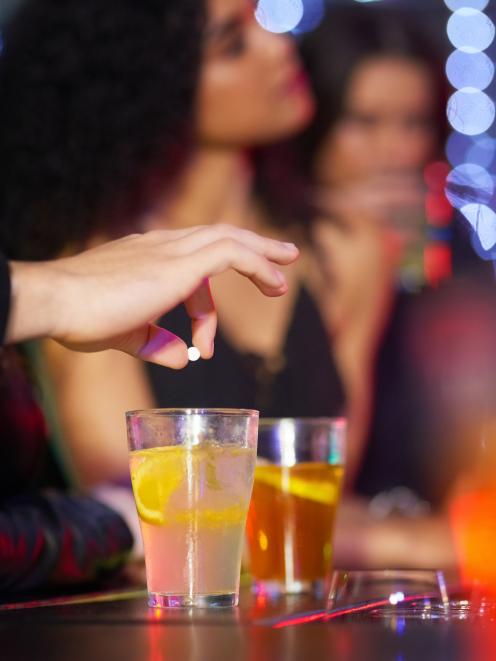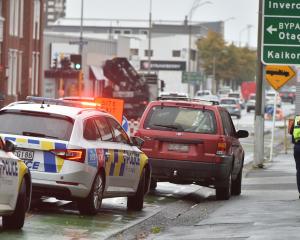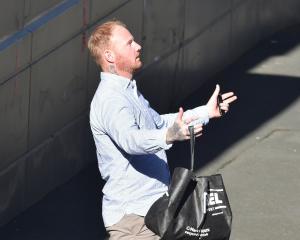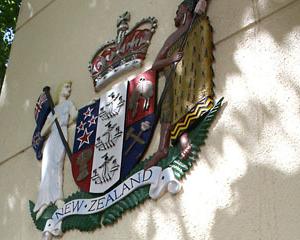
He lured gay men in by a dating app; he was Brazilian, Portuguese, Italian; he was whatever they wanted him to be; he made them trust him. Then he bled their bank accounts dry as they lay unconscious in their own homes. Rob Kidd unmasks the man and speaks to a victim of his crimes ...
Brazilian tourist Diego Marques-Santos loved New Zealand — he had the national flag tattooed on his chest to prove it.
The 32-year-old was a hit with the Kiwi guys too.
Using the gay dating app Grindr, he met like-minded men; they bought food and drinks and went home.Sometimes they had sex.

What Marques-Santos’ victims did not know was that he had been "shoulder-surfing"; watching them enter their PIN earlier in the evening.
In August and September last year, five men — three from Nelson, two from Dunedin — woke in the same state.
They had memories of consuming a drink and then nothing.
Just blackness.
"From a very specific point in the night, it was like someone flicked a light switch off," Dave* told the Otago Daily Times.
"To wake up and realise you’ve been rendered unconscious is bizarre."
Marques-Santos connected with the man on Grindr using the pseudonym "Thiago".
They swapped numbers and the defendant told Dave that he had come over from Portugal and was studying English for nine months.
They were the first in a deluge of lies.
"I guess the extent he was willing to go to was quite extraordinary," said Dave.
"He was quite softly spoke, he was chatty ... all of it you realise is hocus pocus now."
The pair went for a drive around Dunedin, before returning home for pizza and wine.
But when Marques-Santos went to the kitchen to fill their glasses, he secretly mixed clonazepam tablets into the victim’s drink.

The prescription medication had been crushed in preparation.
When Dave commented that the wine seemed gritty, the man told him, unflinchingly, it was not uncommon with South American wine.
It sounded true.
And then the darkness came.
Prof Paul Glue of the University of Otago’s School of Medicine, said clonazepam was a benzodiazepine from the same family as the more common "roofie", or date-rape drug, Rohypnol.
He said it was often prescribed to combat anxiety and insomnia but was also used to treat epilepsy.
With his victim comatose on the couch, Marques-Santos pocketed his credit card and left the house.
At 11.39pm though, the card was swallowed by an ATM after he entered the wrong PIN repeatedly.
Others were not so lucky.
When Dave awoke the next day, he quickly joined the dots.
"I knew straight away."
He staggered around the house, completing a hasty inventory of his valuables, realising it was only the credit card that had been taken.
"To stupefy someone is a violent act," Dave said.
"It’s a violence against people’s dignity."

Rather than skip town, the predator simply blocked his victim on Grindr and less than a week later moved on to his next mark — Scott*.
The lies were different but the plan was the same.
This time Marques-Santos called himself "Leonardo" and claimed to be from Milan.
He met the man at Dunedin cafe Nova where they had a drink and then picked up food from Subway.
Scott was upset Marques-Santos would not pay for his own meal but it was not enough to see them part ways.
From there they got wine from the supermarket and the victim’s suspicions mounted.
He punched his PIN into the terminal quickly, as he felt the man was watching.
But they continued home where Marques-Santos insisted he pour the drinks.
Scott noted his wine appeared to be cloudier than his friend’s but Marques-Santos put his mind at ease, pretending to consume some of the spiked drink.
He had loaded it with so much clonazepam, the victim was out cold for 12 hours.
It gave the Brazilian plenty of time to withdraw $1920 from an ATM and spend more than $300 online on Apple products using the stolen card.
Marques-Santos was eventually cornered by police a few days later at an Invercargill backpackers.
As they traced his movements around the country it became clear the two Dunedin men were not his only victims.
Three men in Nelson came forward, one of whom was a high-profile professional.He and the other victims have permanent name suppression.
Marques-Santos came to New Zealand on a three-month visitor visa in May last year with the intention of obtaining a longer stay as a student.
But once his visa lapsed, his heinous crimes began.
Marques-Santos drained his first victim in Nelson’s bank accounts of nearly $5000, leaving only $6.
Four days later he made off with almost $1000 and his final victim in the city was hit even harder.
Leaving the man unconscious in bed, Marques-Santos withdrew $2000 from an ATM before making 59 online purchases including an airline ticket to Invercargill.
He may not have expected his stay in the Southland city to last three and a-half years.
When Marques-Santos appeared before the Dunedin District Court last month, he was sentenced by Judge Kevin Phillips to that term, to be served at Invercargill Prison.
He had earlier pleaded guilty to four counts of stupefying with intent to commit an imprisonable offence and five of using a document for a pecuniary advantage.
The inmate would be deported as soon as he was eligible, the court heard.
With a bill of more than $10,300, there was no chance of the victims or their banks being reimbursed, the judge said.
He ordered Marques-Santos to repay $1300 — a sum he said he claimed he had stashed in an account set up in Nelson.
Defence counsel Sarah Saunderson-Warner stressed her client had made frank admissions to police on his arrest.
And she disputed the suggestion the victims were highly vulnerable at the time.
"It’s not a situation where you target the drunkest girl in the bar and put a date-rape drug in her drink."
Judge Phillips was not so sure.
"They invited you into their home, they trust you, they like you, found you a person they wanted to be around ... and you were sussing them out all the way through," he said.
"If more alcohol could have been consumed, cardiac arrest and death could have followed. This medication with alcohol can cause death, full stop."
Netsafe chief technology officer Sean Lyons said "hook-up apps" like Grindr and Tinder were ideal vehicles for such scams.
The victims were, on the whole, less likely to tell anyone about the rendezvous beforehand and might not disclose the crime to police due to embarrassment, he said.
But the technology could not be blamed for such incidents.
"It’s not about the app to some extent ... The facilitation of harm is done by the people who may use these tools. It’s a person who’s motivated to cause harm to another person," Mr Lyons told the ODT.
The men who came forward, he said, should be commended for their bravery.
"It’s important for people to hear the story of those victims."
Dave said he would now advise others meeting strangers through Grindr to save that person’s profile photo.
After Marques-Santos left him blacked out on the sofa, he also blocked him on the app, which meant the victim could not pass on his image to police.
Despite his trust being violated, Dave said there was no residual rage for the man he invited into his home.
He simply wondered why.
"I’ll be processing for a while yet. But it’s by no means present for me on a daily basis at all," he said.
"I’m by nature a compassionate and optimistic person and I just find myself going, ‘what a messed-up unit’."
The court heard Marques-Santos had been on hunger strike while behind bars and had been housed in an at-risk unit.
Judge Phillips disregarded the issue at sentencing.
*Names of victims have been changed to protect their anonymity.
A TRAIL OF VIOLATION
MAY: Diego Marques-Santos arrives in New Zealand on a three-month visitor visa, with a view to a longer stay as a student.
AUG 27: Calling himself "Hunter", meets victim 1 at Nelson McDonald’s. Mixes clonazepam with orange juice at the man’s house. Steals eftpos card, withdraws $2480 from victim’s account at ATM.
AUG 31: Meets victim 2 as "Michael" at Nelson McDonald’s. Spikes drink at man’s home. Steals two credit cards and a driver’s licence, withdraws $960 from victim’s account at Richmond ATM.
SEPT 4: Using the name "Miguel Marquez" meets victim 3. After spending three nights at his house, he spikes the man’s drink during dinner. Takes credit card, makes 59 withdrawals and online purchases totalling $4642.
SEPT 10: Meets victim 4 as "Thiago". Claims to be from Portugal studying at the local polytechnic. Goes to the victim’s house for pizza and wine. Mixes the medication with the man’s drink, steals his credit card but enters the wrong PIN at ATM.
SEPT 18: Calling himself "Leonardo" from Milan, meets victim 5 at Dunedin cafe. Mixes clonazepam with wine. Pretends to drink it to prove it is fine. Steals two bank cards, withdraws cash and makes online purchases worth $2262.
Advertisement












